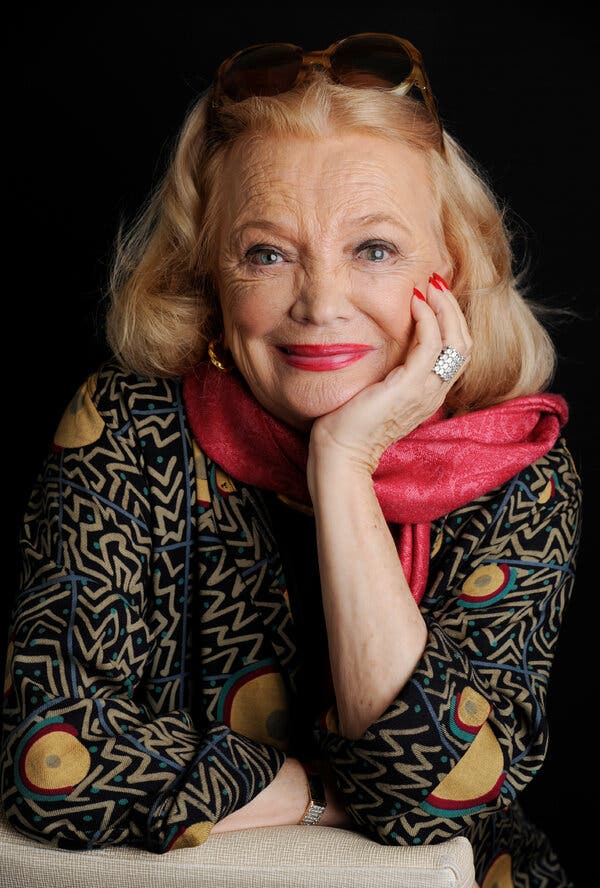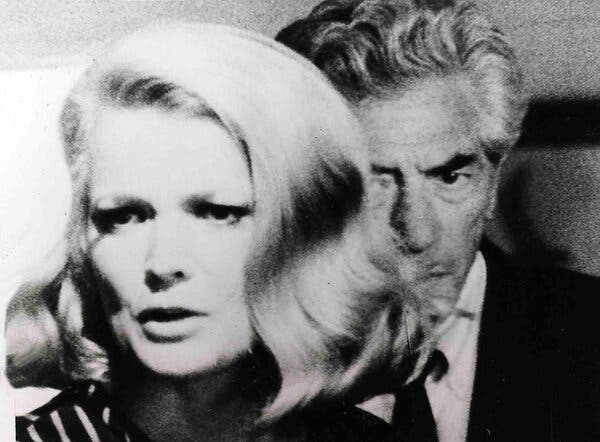
Gena Rowlands, Actress Who Brought Raw Drama to Her Roles, Dies at 94
Known for playing on-the-verge characters, she twice earned Oscar nominations for her work in films directed by John Cassavetes, her husband.
Supported by
Gena Rowlands, the intense, elegant dramatic actress who, often in collaboration with her husband, John Cassavetes, starred in a series of introspective independent films, has died. She was 94.
The death was confirmed on Wednesday night by the office of Daniel Greenberg, a representative for Ms. Rowlands’s son, the director Nick Cassavetes. The office did not say where or when she died or cite a cause. In June, Ms. Rowlands’s family said that she had been living with Alzheimer’s disease for five years.
Ms. Rowlands, who often played intoxicated, deranged or otherwise on-the-verge characters, was nominated twice for best actress Oscars in performances directed by John Cassavetes. The first was the title role in “A Woman Under the Influence” (1974), in which her desperate, insecure character is institutionalized by her blue-collar husband (Peter Falk) because he doesn’t know what else to do. The critic Roger Ebert wrote in The Chicago Sun-Times that Ms. Rowlands was “so touchingly vulnerable to every kind of influence around her that we don’t want to tap her because she might fall apart.”
Her second nomination was for “Gloria” (1980), in which she starred as a gangster’s moll on the run with an orphaned boy.

But it was “Faces” (1968), in which she starred as a young prostitute opposite John Marley, that first brought the Cassavetes-Rowlands partnership to moviegoers’ wider attention. Critics spread the word: Renata Adler described the film in The New York Times as “a really important movie” about “the way things are,” and Mr. Ebert called it “astonishing.”
That was followed by more Cassavetes films. In “Minnie and Moskowitz” (1971), she played a museum employee who lets herself fall in love with a parking lot attendant (Seymour Cassel). In “Opening Night” (1977), she was an actress haunted by the ghost of a fan who had died violently. Her final film collaboration with her husband was “Love Streams” (1984), in which the two played brother and sister.
Ms. Rowlands won three Primetime Emmy Awards for performances in television movies. She won the first for the title role in “The Betty Ford Story” (1987), the second for her portrayal of a destitute widow who takes in a homeless woman in “Face of a Stranger” (1991), and the third for her role as the mother of a troubled young woman (Uma Thurman) in “Hysterical Blindness” (2003). She also received a 2004 Daytime Emmy for her work in “The Incredible Mrs. Ritchie,” a drama about an eccentric widow and a self-destructive teenager.
She received five other Emmy nominations, the first for her role as the mother of a young man with AIDS in “An Early Frost” (1985), one of the first mainstream scripts to deal with the epidemic, and the last for a 2009 guest appearance on the detective series “Monk.”
Ms. Rowlands sometimes said that if she had not married Mr. Cassavetes, her career might have taken a very different turn: She could have been the blonde in romantic comedies. But, she contended, physical beauty was so common in Hollywood that it was irrelevant. When People magazine named her one of the most beautiful people in the world (she was 69) and asked for beauty tips, she suggested: “Sunglasses are the secret. Sunglasses and a little lipstick will take you to the market.”
Gena (she pronounced her first name “Jenna”) Rowlands was born Virginia Cathryn Rowlands on June 19, 1930, in Madison, Wis., the daughter of Edwin M. Rowlands, a banker and state legislator, and Mary Allen (Neal) Rowlands, a painter who later acted in films under the name Lady Rowlands. In 1939, the family moved from Cambria, a Madison suburb, to Washington, where Mr. Rowlands worked in the Agriculture Department during the Franklin D. Roosevelt administration.
Virginia graduated from high school in Arlington, Va., and attended the University of Wisconsin, but she dropped out to study at the American Academy of Dramatic Arts in New York, where she began her acting career. Although she vowed not to marry or have children, she changed her mind after she met Mr. Cassavetes, a recent academy graduate. They married in 1954 and were together until his death at 59 in 1989.
Ms. Rowlands’s television debut was on the series “Top Secret” (1954), which consisted of 15-minute stories about undercover agents. In 1955, she made guest appearances on eight television productions, including a “Robert Montgomery Presents” version of “The Great Gatsby,” in which she played Myrtle Wilson, Tom Buchanan’s déclassé mistress.
The next year she made her only appearance on Broadway, starring opposite Edward G. Robinson in Paddy Chayefsky’s “Middle of the Night,” a play about a 50-ish garment manufacturer who has a romance with a woman in her 20s. Brooks Atkinson, reviewing the play in The New York Times, called her performance “especially good.”
Then Hollywood called. MGM signed her, and she made her feature film debut as José Ferrer’s wife in “The High Cost of Loving,” a 1958 comedy. Other early movies included “Lonely Are the Brave” (1962), a contemporary western with Kirk Douglas; “The Spiral Road” (1962), in which she played the God-fearing fiancée of a young doctor (Rock Hudson); and “A Child Is Waiting” (1963), in which she starred as the mother of an autistic boy, alongside Judy Garland and Burt Lancaster. That was the first film in which she was directed by her husband.
She always returned to television. In the 1960s, she was seen on “Bonanza,” “77 Sunset Strip,” “The Girl From U.N.C.L.E.,” “Dr. Kildare” and other series, and in several dozen episodes of the nighttime soap opera “Peyton Place,” playing the seductive socialite Adrienne Van Leyden, who eventually dies after falling down the stairs at the Peyton mansion.
In later years, she appeared in a segment of the film “Paris, Je T’Aime” (2006), opposite Ben Gazzara, and starred opposite James Garner in “The Notebook” (2004), a film directed by her son, Nick, about a long marriage that can conquer anything but dementia. Her final screen appearances were in “Six Dance Lessons in Six Weeks” (2014), a comic drama about a retiree and her handsome young instructor, and “Unfortunate Circumstances” (2014), a comedy short in which she played a psychotherapist.
In 2015, she received an honorary Oscar.
Ms. Rowlands married Robert Forrest, a retired businessman, in 2012. In addition to her son, he survives her; complete information on survivors was not immediately available.
“We made half our movies in the house,” Ms. Rowlands recalled, explaining her children’s upbringing, in an interview with The St. Louis Post-Dispatch in 1997. “And every time the children would come out of the bathroom with a toothbrush, they would fall over a cable. They assumed everyone lived like that.”
In 1992, Ms. Rowlands revealed to The Los Angeles Times that the psychological work she did to prepare for roles had an unusual side effect. At some point, she noted, she began to dream in character.
“The dreams usually have nothing to do with the script, either,” she said. “It’s just between me and her.”
As for regrets about having sacrificed her life to her art, Ms. Rowlands, in the same interview, disagreed strongly with the whole idea. “It’s the people who aren’t artists who sacrifice,” she said. “Artists somehow stumble onto the best life in the world, and I have no complaints.”
Orlando Mayorquín contributed reporting.
An earlier version of this obituary misstated the number of Primetime Emmy Awards Ms. Rowlands won. It was three, not two.
How we handle corrections
Advertisement